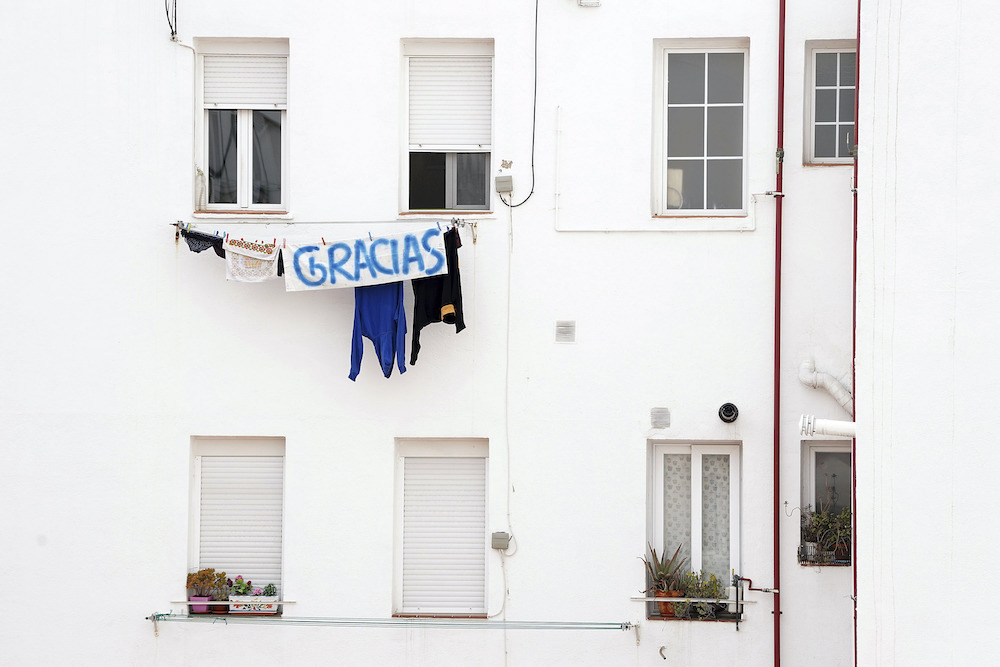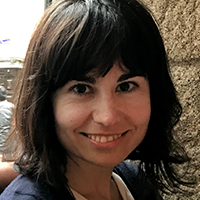
A banner placed by residents in Madrid thanks healthcare and other essential workers in Spain during the COVID-19 pandemic in March 2020
I live in Madrid, the center of the coronavirus epidemic in Spain. Since March 10, I have spent most of my day answering readers’ questions and writing a daily newsletter on the outbreak for my newspaper, eldiario.es.
Tens of thousands are sick and thousands are dying as cases are mounting more rapidly than in China, Italy, and Iran. We are in complete lockdown: we can’t get out of our homes unless it is to buy food and medicines, or go to work in the few cases where workplaces are open, mostly essential services. We can’t even get out for a walk or a run or go into private, common gardens while the army and the police patrol the streets and all local and regional powers are suspended. We can’t travel to another town, even in the country. The main conference center in Madrid is now a field hospital, the biggest such hospital in Spain. A famous skating rink has been transformed into a morgue.
eldiario.es is a membership-based news outlet with a model similar to The Guardian. We have no paywall and we ask readers to pay a recurring subscription fee to support our mission. Our members get a few perks such as access to our scoops a few hours earlier than the rest of the readers. Our main source of revenue is still advertising, but one-third of our revenue comes directly from readers and we have now over 39,000 digital subscribers, more than any other national newspaper in Spain.
We often say we are a public service even though we are a private company. In my two decades working as a journalist, I’ve always liked that definition of our work and mission, but I have never fully seen it in such a crude, direct way as I do today.
During the 14-hour working days in our remote newsroom, I try to filter and clarify the main news of the day amid an avalanche of information and disinformation. I am particularly careful about the tone, avoiding adjectives even more than usual and not highlighting the most gory details in the main body of the e-mail. I avoid big words such as “crisis,” “disaster,” “catastrophe,” “chaos,” “nightmare,” and other words that come to mind these days. I keep some of the things I have found in my reporting for a later day as they won’t add anything useful right now.
Some readers write asking for more good news. It makes no sense to avoid the main bad news. The most complete information is an essential tool for public health. Everyone needs to know how bad the situation is so they can act accordingly: sugar-coating the information would be dangerous and irresponsible. But in the newsletter I try to include some more optimistic bites.
On the top section with “the latest,” I keep a paragraph called “something good,” where I include news about vaccines, treatments, solidarity, and innovation. There is also a part for inspiration on things to do, read, or watch from home. I’ve included personal recommendations such as an episode of the podcast “Aria Code” on “Porgy and Bess,” a webcam showing the cliffs of the Shetlands Islands, and many inspiring videos of the clapping and singing we do every night from our windows to thank health workers for their effort and sacrifice.
Many readers write to me asking questions and making suggestions. In these circumstances, I do my best to find the best sources of information from public and private institutions, and pass along some answers with all the caution about the uncertainties we face. But I try to reply even in the cases when the answer is that we have no answer. Readers write about their sick babies, their symptoms, the suspicious audios they get via WhatsApp, their anxieties of losing unemployment benefits soon, their difficulties opening a link from The Washington Post in Spain. They also write to thank me and thank the newsroom for its work on a story that is touching their lives in so many ways. We have published many explainers but this is a reader-by-reader, personal job.
One of the many effects of the Spanish lockdown has been a sudden decline in advertising revenue, which still accounts for two-thirds of the revenue of eldiario.es. It’s a very young newspaper. It was founded by journalists in 2012 and it’s been profitable ever since. It’s still owned by journalists and has a 100-people newsroom. Now it faces a dangerous situation as do many other newspapers around the world.
When I’m not writing our daily newsletter, I participate in conference calls with other members of the management team as director of strategy, which is my current position at eldiario.es. In those meetings, we’ve discussed the state of our finances and which kinds of decisions we can make so the newspaper can survive.
We’ve cut the salaries of the top editors and limited the pieces commissioned to freelancers. After much debate, we have decided to increase the annual subscription fee from €60 to €80. If readers tell us they can’t afford the new price, we let them keep the old fee. The response of our members has been overwhelmingly positive. Over 90% of members have accepted the new annual fee. In a day, we got over 1,000 new members and over 1,600 members asked to pay even more on their own volition. In just a few hours, the numbers were so high we had to double- and triple-check to make sure that it was not a mistake. It was not. At this pace, membership revenue is going to make up for the losses in our worst-case scenario outlook.
It’s now hard to even visualize how and when we will go back to business as usual, if ever. Our newspaper, as our country and most of the companies, will struggle for many months. But I believe we will be changed after we overcome this. We will understand our priorities better. Readers and journalists will have a more clear understanding of when information is actually a precious, public good, and also when it’s not.


